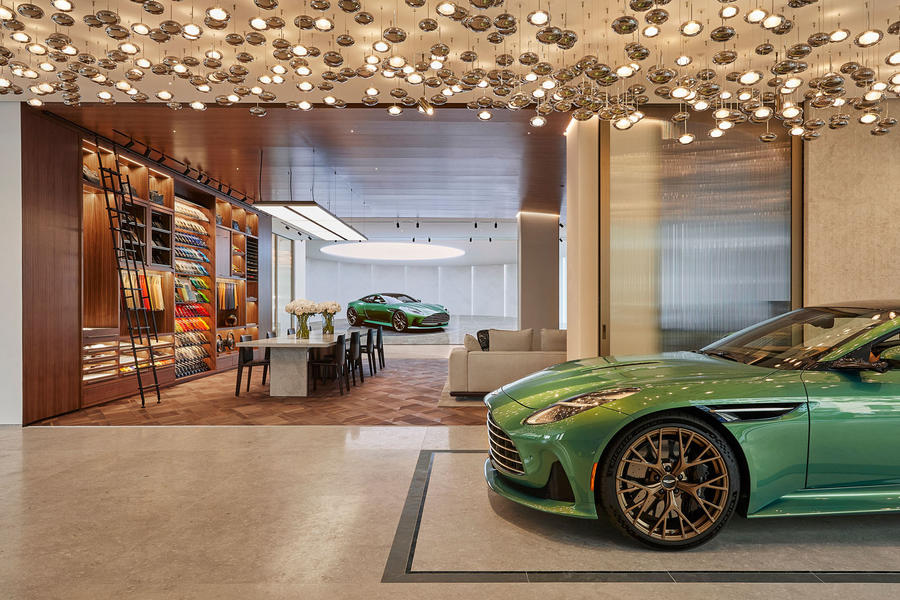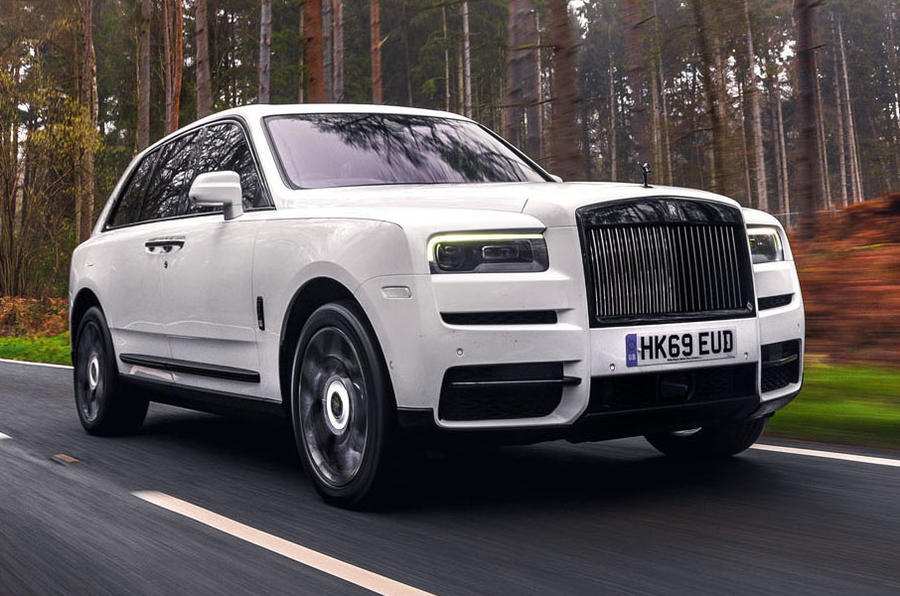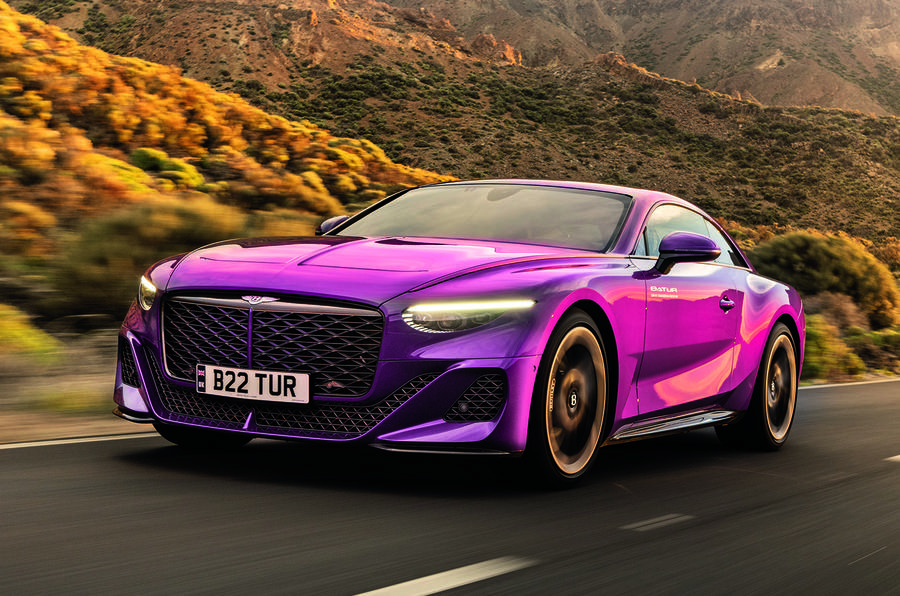Ultra-luxury brands take design teams to customers to better sell them high-margin personalisation
Bentley Mulliner designer Hugo R Chizlett remembers the time his design manager flew to Texas to be handed a lump of sandstone. The customer wanted their new car to match the colour of their house and Bentley’s bespoke Mulliner service was happy to oblige. “He had to pay extra because his bag was overweight,” Chizlett said.
Such is the money to be made in one-off options that ultra-luxury brands such as Bentley, Rolls-Royce, Aston Martin and Mercedes-Benz’s Maybach unit are increasingly moving the mountain to Mohammed: bringing members of the design team direct to customers during the purchase of new cars in order to better sell them high-margin personalisation.
To facilitate this, brands such as Rolls-Royce, Maybach and Aston Martin are even opening their own, luxuriously appointed spaces situated in cities close to where their customers live but with a direct feed into brand HQ.
This isn’t a direct-selling, agency-style model. The ultra-luxury car companies know they need their dealers to continue to invest in their network of exclusive showrooms and maintain their extensive contact lists.
But it’s also clear the ultra-luxury companies are seeing the dealer as a barrier to the customer as they expand model lines and broaden their personalisation offering. “The retail part of the journey is extremely important, but here automotive is probably the most dinosauric in its ways,” said Lawrence Stroll, chairman of Aston Martin, at a recent press event at the company’s HQ in Gaydon, Warwickshire.
Aston Martin, like all traditional ultra-luxury brands, sells its cars to the dealer, who then sell to the customer. “Customers are not coming to Gaydon very often, as much as we’d like them to. So what is their interaction with us? It’s with the person selling them the car,” Stroll said. “We rarely got to speak to the customers.”
To counter that, Aston Martin is opening its own network of “retail experiences” branded under its Q bespoke service, starting with Q New York on Park Avenue. Stroll said he wants to open 10-12 Q spaces globally that will act as “mega-billboards” to inspire not just Aston’s customers but also its dealers.

The Q stores “exude what the Aston Martin experience is like”, Stroll said. In New York, a 40m, 2100-bulb chandelier lights up the interior space and the cars within, which are visible through the ‘Champagne Frame’ – a vast pane of glass Aston Martin reckons is one of the largest ever to be installed into a building in the city.
The idea is that they become a beacon for Aston dealerships, who’ll wear a “slightly diluted” version of the new corporate identity. “They’ll show our dealers how to do it right,” Stroll said.
Rolls-Royce, meanwhile, is opening a network of what it calls “private offices”, starting with Dubai, followed by Seoul in South Korea and eventually in “all major capital cities worldwide,” CEO Torsten Müller-Ötvös told Autocar at the recent Spectre electric coupé launch.

“The intention is to bring Goodwood as close as possible to our clients,” Müller-Ötvös said, referring to the company’s HQ and factory in southern England. The world’s ultra-high-net-worth individuals might all be fabulously wealthy but not all can spare the time to sit down with designers and craftspeople in Goodwood (or Bentley in Crewe or Aston Martin in Gaydon).
Rolls-Royce’s Dubai office, overlooking the dramatic new Museum of the Future, features a vast green screen that “transports you directly to Goodwood”, Müller-Ötvös said. The offices are staffed not by salespeople but members of the design team, there to guide you through the multiple bespoke options. For example, the upcoming Shanghai office will be run by a former member of BMW’s Designworks studio in the same city. “It’s not just a room where you can spec your car. It’s far, far more,” Müller-Ötvös said.
Bentley’s approach is slightly different in that it will send its Mulliner design team out to meet clients globally, sometimes using large, high-definition screens set up across its dealer network to go through the bespoke options.
“We’re a fully mobile team,” Ansar Ali, Bentley Mulliner director, said during a recent visit to the specification room at the newly opened HR Owen Bentley dealership in Hatfield, Hertfordshire. “Customers are time poor, cash rich. They want to meet people like Hugo from Mulliner,” he said.
On the Hatfield tour, Chizlett races through a demonstration of Bentley’s far more sophisticated version of a standard online configurator to change the seat stitching colour and patterning, swapping out the standard black walnut veneer for stone, toggling between tweed and leather, repainting brake calipers and much more. In a blur, he completely changes the character of the Continental GT from genteel tourer to mean street machine, just with a few clicks of the mouse.
“Nine times out of 10, the customer doesn’t know what they want. Someone like Hugo will create that kindle of inspiration,” Ali says. “We sensitively consult and then lead the witness.”
Having that direct line to people who actually helped create the car becomes a powerful sales tool, even if doesn’t feel like one. They are now plugged directly into the Bentley, Rolls-Royce, Aston Martin or Maybach brand ‘story’. “Many customers want to go away with a story. Meeting the designer, meeting the craftsman in the Mulliner workshop – those stories are unique to them,” Ali says. “You don’t feel like you’re opposite a salesman. It doesn’t have that transactional relationship when you’re so engrossed in it.”

Elevating the experience beyond that of mere car buying is part of the process. “It’s important we go beyond, not just in terms of product but also customer expectations,” Daniel Lescow, head of Mercedes-Benz luxury brand Maybach, told Autocar in Shanghai earlier this year. Maybach recently opened its first ‘Atelier’ in the city ahead of a global roll-out. “It’s a very quiet space to have your own salon privé,” Lescow said, borrowing the language of high-end fashion.
It’s very profitable process. Bentley says the average owner spends £30,000 on factory options and another £30,000 on Mulliner bespoke extras. At Rolls-Royce, meanwhile, Müller-Ötvös says the average selling price of car with bespoke options in the 10 years he’s been there has risen from £250,000 to half a million.
Rolls-Royce is “expanding the bespoke business in a significant way”, Müller-Ötvös said. A new extension at the Goodwood factory includes a new paint shop. “We get unbelievable demand for the most eclectic paint jobs that cover 15, 18, 20 layers, be it candy paint or whatever,” Müller-Ötvös said.
However, the dealers remain in the picture. At Rolls-Royce, the only way into a ‘private office’ is via an invitation from a dealer. “It has nothing to do with direct sales,” Müller-Ötvös is quick to point out. In fact, he says it’s a “win-win situation for all parties” because the extras generated from the consultation in the office boost the final price of the car sold by the dealer.
While other brands such as Mercedes-Benz, Stellantis, Ford, BMW and others are moving to the ‘agency’ sales model for a more direct interaction with their customers, the ultra-luxury car companies are firmly in favour of the status quo. For one thing, it would be horrendously expensive. “We couldn’t afford to build 220 dealers around the world, fill them with 4000 people, fund all the stock, have all that interaction and at the same time develop five cars in five years,” Bentley CEO Adrian Hallmark said at the Hatfield event.
Hallmark’s counterpart at Lamborghini, Stephan Winkelmann, also champions the dealers over a model where Lamborghini would sell directly. “Dealers are the ambassadors of the brand,” he said on a recent tour to the same Hatfield complex, where Lamborghini also has a showroom. “”Selling cars is still the main activity but more and more it’s to entertain and to make [buyers] feel part of the club.”
![]()
Dealers are plugged into local networks of wealthy potential buyers in a way that car makers would find hard to replicate.
But the ultra-luxury brands worry the dealers are a short-circuit to the connection with the car’s creators that has proven such an intoxicating sales tool. By setting up shop closer to the customers, they hope to export the factory magic and boost selling prices even more.
Source: Autocar